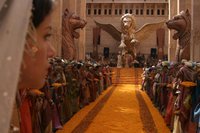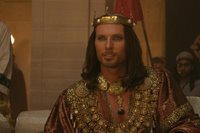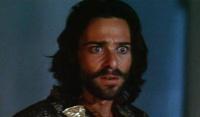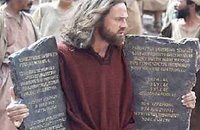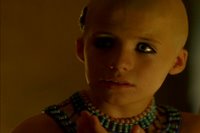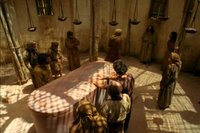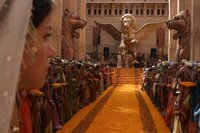This is an article I wrote for the Open Heaven Church website back in the days before this blog really existed. It's likely that the article will disappear from that site shortly, so I thought I ought to repost it before it disappeared forever.
===

Of all the events narrated in the Bible, perhaps the hardest to picture, let alone understand, are those in Genesis. Whilst there have been several attempts by filmmakers to capture these formative events on celluloid, their most productive time was actually back in the silent period. The most comprehensive lists cite around 20 films on the various stories made during the silent period, and a further six in the first 10 years of the “talkie” period. By contrast, the past 70 years have only produced a similar number.
The first film made about a story in Genesis was the French film
Joseph Vendu Par Ses Frères (Joseph Sold by his Brothers) made in 1904. Other notable films in this early period included 1928 silent version of
Noah’s Ark (where allegedly some people actually died filming the spectacular flood scene
[1]),
and The Green Pastures (1936) a child’s daydreamed version of the stories she is hearing in Sunday School.

The
Green Pastures was probably the first film to portray God, and certainly the first to portray him as a black man. Unsurprisingly the Ku Klux Klan were outraged and protested causing many theatre owners to refuse to show it. The Genesis scenes, being seen through a child’s imagination make no attempt to be realistic, but their gentle humour, and basic simplicity give the film a spiritual authenticity that is absent from the majority of these films.

Perhaps the best known Genesis film was made by John Huston in 1966.
The Bible looked at the first 22 chapters of Genesis, starting with a wonderfully filmed creation sequence (voiced by Huston himself), and progressing through to Abraham and Isaac.
The Bible was made at the end of the golden era of the biblical epic, and wisely avoids making this into a spectacular but camp, bathrobe drama. Instead its dark lighting gives much of the film a strange sense of the dawn of time, and the primitive nature of the cultures involved.

At the same time the literalism of the presentation will both find favour with those who take a more literal understanding of the “how” questions of creation, whilst also giving it the air of archetypal myth that adopt a more symbolic interpretation.
 The Bible
The Bible was the last Hollywood film based on the Old Testament for over 30 years, with the exception of Richard Gere’s 1985 turn as
King David, (replete with his undignified monkey dancing in front of a returning Ark of the Covenant). Instead most bible films began to be made for the TV and the church market. Typical of this was the late seventies “
Greatest Heroes of the Bible” series, which included the stories of Noah, The Tower of Babel, Sodom and Gomorrah, Abraham, Joseph. Around the same time the American organisation Campus Crusade (who made the 1979
Jesus film) made
Genesis. This was a word for word, bland narration of the whole book accompanied by fairly uninspiring images which lasted for four long hours. It’s biggest plus point was it’s use of Middle Eastern actors, but it’s no surprise that none of them subsequently became the new Omar Sharif.

The eighties were a dry old time for cinematic versions of the book. Only the intriguingly titled Italian film
Adam and Eve: The First Love Story and Mrinal Sen’s Hindi adaptation of the first five chapters were even made.

The nineties were a different matter. With Phil Collin’s namesake rock band out of the way, the bible’s opening tome was back in business. Whilst there were many Genesis movies made over that decade the majority were made by the Italian-American based company Lux Vide. Lux Vide put together 11 Old Testament stories as part of their “Bible Collection”, which also includes three New Testament films
Jesus, Paul and
The Apocalypse (
my review), as well as four largely fictional spin offs, (each loosely based on a marginal New Testament character). Four of the Old Testament episodes were based on the events in Genesis -
Creation and Flood, Abraham, Jacob and
Joseph, and all four have their points of interest.
Abraham, Jacob and
Joseph frequently pierce the Sunday School cocoon that surrounds many tellings of these stories, both in cinema and other media, by including stories such as The Rape of Dinah, and Judah and Tamar that are so awkward, real, embarrassing and controversial that they are usually excluded completely. And the performances of Richard Harris, Sean Bean and Ben Kingsley respectively are usually worth watching in their own right.

Of the four,
Genesis: Creation and Flood (1994) is possibly the jewel in the crown. Certainly it is strikingly different from the more traditional and straightforward tellings of the story that the other films give us. Instead of attempting to emulate the pattern of the earlier
The Bible, or of the other films in the series,
Genesis: Creation and Flood sets it’s own course. Covering the first eight and half chapters the film shows us the stories through the eyes of an old man telling his grandson the history of his people. Paul Schofield narrates in all but a few passages, only occasionally interrupted by a female counterpart.

The narration is accompanied by a striking series of images, occasionally interspersed by shots of Grandfather and the child, and other members of their family. It is an unusual effect. As Peter T Chattaway notes how normally you would be able to “follow any film's basic narrative thrust with the sound turned off… Genesis would fail that test”.
[2] In other words the narration shapes how the images are perceived. In a sense, this is like the act of creation itself, bringing form and order to the otherwise chaotic and unintelligible. The slow pacing of the film also gives it a meditative feel, enabling the audience to let the images wash over them whilst highlighting the words that drive them, and bring them meaning. This relaxed pace also brings a level of internal calm and thus transports the viewer to another time and another place far more effectively.

Ultimately then
Creation and Flood is far more poetic than any of it’s predecessors, and it is ironic that a film which is essentially driven by such a narrative and literary work is ultimately so unliterary and poetic as a final product. It’s also interesting how the stress here on the story being passed down from generation to generation reflects the oral tradition that preceded and underlies the written text we have today.

Another film that takes this community narrative approach was a made for TV movie
In the Beginning (2000). Martin Landau headed up a strong cast, playing Abraham; just four years after he had played Abraham’s grandson Jacob in the aforementioned
Joseph. At over three hours,
In the Beginning had plenty of time to cram in a number of these stories, and as a result, it could afford to continue well into Exodus. The creation scene here is also told by way of a flashback, but the sequence is so overloaded with explosive special effects, and cheap modern documentary footage it completely strips the event of its mystery and gravitas.

The end of the millennium brought with it a flood of biblical stories, and Genesis films were no exception. Chief amongst the offenders was another TV movie
Noah’s Ark (1999), which was almost as unwelcome as the events it depicts. It is difficult to imagine what motivated the production of this film. Its attempt to weave futuristic elements into a pre-historic myth backfires more spectacularly than a seventies Robin Reliant. The bizarre futuristic elements evoke Kevin Costner’s mega flop
Waterworld. Had that film been a success this at least could be called a cheap cash in, but as it was a commercial disaster that cannot have been the driving factor. Similarly terrible is the ludicrous attempt to pass off its idiotic amalgamation of the stories of Lot and Noah with the ridiculous off-hand comment “by the time they finish the story of Sodom and Gomorrah they will probably say we weren't even there."
The only potential merit of the film is that it solves the debate on God’s foreknowledge for ever. Noah’s Ark is so bad that if God had known the flood would spawn this stinker, he may have opted for another method of world destruction, (or at least have made sure that this was destroyed along with everything else). Frankly, it deserves every “wooden acting” joke that critics can throw at it.

Another poorly executed Genesis film is the straight to video
Prince of Egypt prequel
Joseph King of Dreams. The film does have some good points, notably the dream sequences which certainly benefit from a more creative and more expressive medium. However, the tiresome songs quickly become so dull that ultimately you begin to wonder if a spell in prison like Joseph’s might be far preferable.

Perhaps the best Genesis film of recent years (and of all time) is Cheick Oumar Sissoko’s
La Genèse(1998). Sissoko’s film tells the story of Abraham’s family from an African perspective, and as a result, it is recorded in the Bambara language of Mali, spoken by only few million people. As a result
La Genèse understands the nomadic tribal context in which these stories are set, far better than any number of Hollywood films, and brings with it a number of fascinating insights.

It also refuses to lionise its protagonists, and emphasises just how dysfunctional this family was at times. Too often these characters have been stripped of their humanity, and shown simply as one dimensional heroes.
La Genèse gives a more realistic picture which honours the God who uses such ordinary, broken unreliable people to further his will, and offers us hope that he can use us as well.
La Genèse is also beautifully filmed capturing the wonderful landscapes, and capturing something of the empty space that typified the world several thousand years ago. Nevertheless, at times the film is very stark and brutal in what it captures – starring unflinchingly at some of the more earthy elements of the story.

It’s the ability of this film to bring a new angle to well known and familiar stories that makes it so valuable. There have been many films on the various Genesis stories, but only a handful bring something insightful, interesting or challenging. Of these three stand out in particular.
The Bible (1966) simultaneously shuns the worst excesses of the 50s and 60s Biblical Epics whilst subverting some of the genre’s standard features.
La Genèse (1998) brings the tribal context to the fore, exploring the stories with an authenticity that is largely absent otherwise. Finally,
Genesis: Creation and Flood (1994)
, offers us the chance to reflect on scripture anew as it draws attention to the poetic nature of the text.
[1] Various reports of this, the best online can be found at www.jimusnr.com/Noahsark.html
[2] www.canadianchristianity.com/cgi-bin/bc.cgi?bc/bccn/0501/artvideosLabels: Abraham, Adam and Eve, Bible (The - Huston), Genèse, Genesis, Jacob, Joseph (Genesis), Lists
 Omar Sharif starred in two of last year's Bible Films - the cinematically released One Night With the King and the TV series Ten Commandments (2006) and I've just caught wind of a third Sharif Bible film released in March of this year (although produced in 2005). St. Peter is another Bible film from the seemingly inexhaustible Lux Vide (who brought us The Bible Collection) and stars Sharif in the lead role. Here's the blurb from the press release:
Omar Sharif starred in two of last year's Bible Films - the cinematically released One Night With the King and the TV series Ten Commandments (2006) and I've just caught wind of a third Sharif Bible film released in March of this year (although produced in 2005). St. Peter is another Bible film from the seemingly inexhaustible Lux Vide (who brought us The Bible Collection) and stars Sharif in the lead role. Here's the blurb from the press release:














